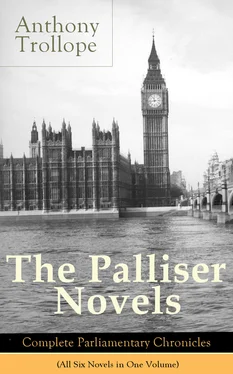“I don’t know that he’s any great catch,” Bunce had said, when the prospect of their lodger’s departure had been debated between them.
“Jacob,” said his wife, “I don’t think you feel it when you’ve got people respectable about you.”
“The only respectable man I know,” said Jacob, “is the man as earns his bread; and Mr. Finn, as I take it, is a long way from that yet.”
Phineas returned to his lodgings before he went down to his club, and again told Mrs. Bunce that he had altogether made up his mind about the chambers. “If you’ll keep me I shall stay here for the first session I daresay.”
“Of course we shall be only too proud, Mr. Finn; and though it mayn’t perhaps be quite the place for a member of Parliament—”
“But I think it is quite the place.”
“It’s very good of you to say so, Mr. Finn, and we’ll do our very best to make you comfortable. Respectable we are, I may say; and though Bunce is a bit rough sometimes—”
“Never to me, Mrs. Bunce.”
“But he is rough,—and silly, too, with his radical nonsense, paying a shilling a week to a nasty Union just for nothing. Still he means well, and there ain’t a man who works harder for his wife and children;—that I will say of him. And if he do talk politics—”
“But I like a man to talk politics, Mrs. Bunce.”
“For a gentleman in Parliament of course it’s proper; but I never could see what good it could do to a law-stationer; and when he talks of Labour going to the wall, I always ask him whether he didn’t get his wages regular last Saturday. But, Lord love you, Mr. Finn, when a man as is a journeyman has took up politics and joined a Trade Union, he ain’t no better than a milestone for his wife to take and talk to him.”
After that Phineas went down to the Reform Club, and made one of those who were buzzing there in little crowds and uttering their prophecies as to future events. Lord de Terrier was to go out. That was certain. Whether Mr. Mildmay was to come in was uncertain. That he would go to Windsor tomorrow morning was not to be doubted; but it was thought very probable that he might plead his age, and decline to undertake the responsibility of forming a Ministry.
“And what then?” said Phineas to his friend Fitzgibbon.
“Why, then there will be a choice out of three. There is the Duke, who is the most incompetent man in England; there is Monk, who is the most unfit; and there is Gresham, who is the most unpopular. I can’t conceive it possible to find a worse Prime Minister than either of the three;—but the country affords no other.”
“And which would Mildmay name?”
“All of them,—one after the other, so as to make the embarrassment the greater.” That was Mr. Fitzgibbon’s description of the crisis; but then it was understood that Mr. Fitzgibbon was given to romancing.
Chapter VIII.
The News About Mr. Mildmay and Sir Everard
Table of Contents
Fitzgibbon and Phineas started together from Pall Mall for Portman Square,—as both of them had promised to call on Lady Laura,—but Fitzgibbon turned in at Brooks’s as they walked up St. James’s Square, and Phineas went on by himself in a cab. “You should belong here,” said Fitzgibbon as his friend entered the cab, and Phineas immediately began to feel that he would have done nothing till he could get into Brooks’s. It might be very well to begin by talking politics at the Reform Club. Such talking had procured for him his seat at Loughshane. But that was done now, and something more than talking was wanted for any further progress. Nothing, as he told himself, of political import was managed at the Reform Club. No influence from thence was ever brought to bear upon the adjustment of places under the Government, or upon the arrangement of cabinets. It might be very well to count votes at the Reform Club; but after the votes had been counted,—had been counted successfully,—Brooks’s was the place, as Phineas believed, to learn at the earliest moment what would be the exact result of the success. He must get into Brooks’s, if it might be possible for him. Fitzgibbon was not exactly the man to propose him. Perhaps the Earl of Brentford would do it.
Lady Laura was at home, and with her was sitting—Mr. Kennedy. Phineas had intended to be triumphant as he entered Lady Laura’s room. He was there with the express purpose of triumphing in the success of their great party, and of singing a pleasant paean in conjunction with Lady Laura. But his trumpet was put out of tune at once when he saw Mr. Kennedy. He said hardly a word as he gave his hand to Lady Laura,—and then afterwards to Mr. Kennedy, who chose to greet him with this show of cordiality.
“I hope you are satisfied, Mr. Finn,” said Lady Laura, laughing.
“Oh yes.”
“And is that all? I thought to have found your joy quite irrepressible.”
“A bottle of soda-water, though it is a very lively thing when opened, won’t maintain its vivacity beyond a certain period, Lady Laura.”
“And you have had your gas let off already?”
“Well,—yes; at any rate, the sputtering part of it. Nineteen is very well, but the question is whether we might not have had twenty-one.”
“Mr. Kennedy has just been saying that not a single available vote has been missed on our side. He has just come from Brooks’s, and that seems to be what they say there.”
So Mr. Kennedy also was a member of Brooks’s! At the Reform Club there certainly had been an idea that the number might have been swelled to twenty-one; but then, as Phineas began to understand, nothing was correctly known at the Reform Club. For an accurate appreciation of the political balance of the day, you must go to Brooks’s.
“Mr. Kennedy must of course be right,” said Phineas. “I don’t belong to Brooks’s myself. But I was only joking, Lady Laura. There is, I suppose, no doubt that Lord de Terrier is out, and that is everything.”
“He has probably tendered his resignation,” said Mr. Kennedy.
“That is the same thing,” said Phineas, roughly.
“Not exactly,” said Lady Laura. “Should there be any difficulty about Mr. Mildmay, he might, at the Queen’s request, make another attempt.”
“With a majority of nineteen against him!” said Phineas. “Surely Mr. Mildmay is not the only man in the country. There is the Duke, and there is Mr. Gresham,—and there is Mr. Monk.” Phineas had at his tongue’s end all the lesson that he had been able to learn at the Reform Club.
“I should hardly think the Duke would venture,” said Mr. Kennedy.
“Nothing venture, nothing have,” said Phineas. “It is all very well to say that the Duke is incompetent, but I do not know that anything very wonderful is required in the way of genius. The Duke has held his own in both Houses successfully, and he is both honest and popular. I quite agree that a Prime Minister at the present day should be commonly honest, and more than commonly popular.”
“So you are all for the Duke, are you?” said Lady Laura, again smiling as she spoke to him.
“Certainly;—if we are deserted by Mr. Mildmay. Don’t you think so?”
“I don’t find it quite so easy to make up my mind as you do. I am inclined to think that Mr. Mildmay will form a government; and as long as there is that prospect, I need hardly commit myself to an opinion as to his probable successor.” Then the objectionable Mr. Kennedy took his leave, and Phineas was left alone with Lady Laura.
“It is glorious;—is it not?” he began, as soon as he found the field to be open for himself and his own manœuvring. But he was very young, and had not as yet learned the manner in which he might best advance his cause with such a woman as Lady Laura Standish. He was telling her too clearly that he could have no gratification in talking with her unless he could be allowed to have her all to himself. That might be very well if Lady Laura were in love with him, but would hardly be the way to reduce her to that condition.
Читать дальше












